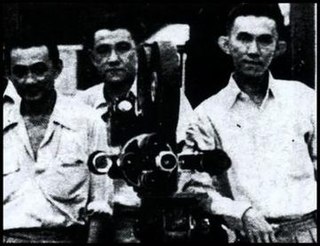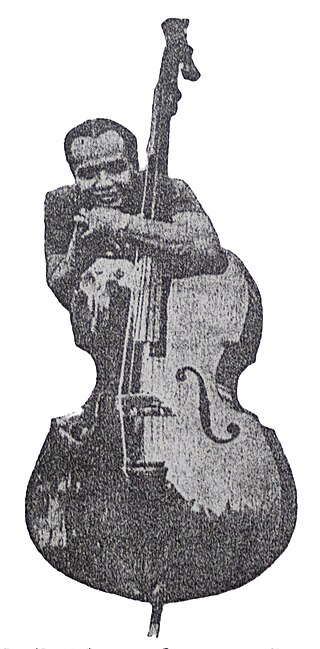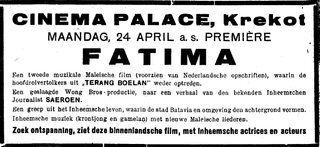
Njai Dasima is a 1929 silent film from the Dutch East Indies. It details the fall of a rich mistress at the hands of a greedy delman driver. The first film released by Tan's Film, the film – adapted from an 1896 novel – was a critical and commercial success. It was released in two parts, followed by a sequel, and remade another two times by 1940.

Hajji Raden Mochtar, often credited as Rd Mochtar, was an Indonesian actor. Of noble descent, Mochtar was discovered by Albert Balink and first cast in the commercial failure Pareh (1936). Rising to popularity after the release of Terang Boelan the following year, he spent nearly sixty years in film, while also becoming a businessman and farmer.
Nancy Bikin Pembalesan is a 1930 film from the Dutch East Indies. It was released by Tan's Film Company and a sequel to the 1929 two-part film Njai Dasima; it follows Dasima's daughter Nancy on her quest for vengeance. Like its predecessor, it was a commercial and critical success.

Terang Boelan is a 1937 film from the Dutch East Indies. Written by Saeroen, directed by Albert Balink, and starring Rd Mochtar, Roekiah and Eddie T. Effendi, Terang Boelan follows two lovers who elope after one is almost forced to marry an opium smuggler. The film was shot in the Indies and Singapore, and was partially inspired by the 1936 Hollywood film The Jungle Princess. It was aimed at native audiences and included keroncong music, which was popular at the time, and several actors from Balink's previous work Pareh (1936).
Melati van Agam is a 1931 romance film directed by Lie Tek Swie and produced by Tan's Film. Starring A. Rachman, Neng Titi, Oemar, and Bachtiar Effendi, the two-part film follows the young lovers Norma and Idrus. The film, which may be lost, was reportedly a commercial success, but critical reviews were less favourable.
Lie Tek Swie was an Indonesian film director active in the early cinema of the Dutch East Indies. He is thought to have begun his career at a film distributor's office before making his directorial debut in 1929 with Njai Dasima, the first of three literary adaptations that he directed. His other three films, two of which were made for Tan's Film, were original stories. In 1941 Lie was a founding member of the Standard Film Company, which closed in 1942.

The Wong brothers were three ethnic Chinese film directors and cameramen active in the cinema of the Dutch East Indies. The sons of an Adventist preacher, the brothers – Nelson (1895–1945), Joshua (1906–1981), and Othniel (1908–1986) – received much of their education in the United States before going to Shanghai and establishing The Great Wall Productions.

Saeroen was an Indonesian journalist and screenwriter. Born in Yogyakarta, he became a journalist after a time working at a railway station. By the mid-1930s he had established the daily Pemandangan with Oene Djunaedi and was writing editorials with the pen name Kampret. When the paper was dissolved, Saeroen drifted into the film industry as a writer, making his debut with Albert Balink's Terang Boelan (1937). Much of his later life was spent working with several minor publications.

Raden Mas Kartolo was an Indonesian actor and songwriter. Born in Yogyakarta to a noble family, he entered the theatre and married the actress Roekiah around 1933. The two, living in Batavia acted in numerous movies together, starting with the 1938 hit Terang Boelan. However, Roekiah was always cast with other actors as her romantic interest. After Roekiah died in 1945, Kartolo brought the family to Yogyakarta and worked with Radio Republik Indonesia until his death. One of his sons, Rachmat Kartolo, went on to be an actor in the 1960s and 1970s.
Tan Tjoei Hock was an Indonesian journalist and filmmaker. Born in Batavia, he was discovered by The Teng Chun in the late 1930s. Tan became one of the most productive film directors of the Dutch East Indies between 1940 and 1941, directing nine films – primarily action.

Siti Akbari is a 1940 film from the Dutch East Indies directed by Joshua and Othniel Wong and produced by Tan Khoen Yauw. Starring Roekiah and Rd Mochtar, it follows a couple while the husband commits adultery.

Fatima is a 1938 film from the Dutch East Indies directed by Othniel and Joshua Wong. Written by Saeroen, it starred Roekiah, Rd Mochtar, and ET Effendi and followed two lovers who are disturbed by a rich youth. The film followed the same formula as the earlier hit Terang Boelan, and saw commercial success domestically. It is one of three films which Misbach Yusa Biran credits with reviving the domestic film industry, which had been faltering.

Gagak Item is a 1939 bandit film from the Dutch East Indies directed by Joshua and Othniel Wong for Tan's Film. Starring Rd Mochtar, Roekiah, and Eddy T. Effendi, it follows a masked man known only as "Gagak Item". The black-and-white film, which featured the cast and crew from the 1937 hit Terang Boelan, was a commercial success and received positive reviews upon release. It is likely lost.
Si Ronda is a 1930 silent film from the Dutch East Indies which was directed by Lie Tek Swie and starred Bachtiar Effendi. Based on contemporary Betawi oral tradition, it follows the exploits of a bandit, skilled in silat, known as Si Ronda. In the lenong stories from which the film was derived, Ronda was often depicted as a Robin Hood type of figure. The production, now thought lost, was one of a series of martial arts films released between 1929 and 1931. Si Ronda received little coverage in the media upon its release. A second adaptation of the tale, Si Ronda Macan Betawi, was made in 1978.

Sorga Ka Toedjoe is a 1940 film from the Dutch East Indies directed by Joshua and Othniel Wong for Tan's Film. It follows an older couple who are reunited by another, younger couple after years of separation. The black-and-white film, the first production by Tan's Film after the departure of Rd Mochtar, featured kroncong music and was targeted at lower-class native audiences. It was a commercial and critical success. Roekiah and Djoemala took leading roles in three more films before Tan's closed in 1942. Sorga Ka Toedjoe is now thought lost.

Bengawan Solo is a now-lost 1949 film from what is now Indonesia. Directed by Jo An Djan, it starred Sofia WD, Rd Mochtar, and Mohamad Mochtar.

Dasima is a 1940 film from the Dutch East Indies directed by Tan Tjoei Hock and produced by The Teng Chun. It is the third adaptation of G. Francis' 1896 novel Tjerita Njai Dasima.
Njai Dasima is a 1932 film from the Dutch East Indies which was directed by Bachtiar Effendi for Tan's Film. It was the second film adapted from G. Francis' 1896 novel Tjerita Njai Dasima, following a silent version in 1929. Starring Momo and Oesman, it followed a young Sundanese njai (concubine) who is tricked into marrying a man who does not love her and ultimately killed for her money. The film, the first talkie produced by its company, was also the first directed by a native Indonesian. The now-lost work received mixed critical reception.

Elly Joenara was an Indonesian film actress who later became a producer. She was the wife of producer Djamaluddin Malik.















